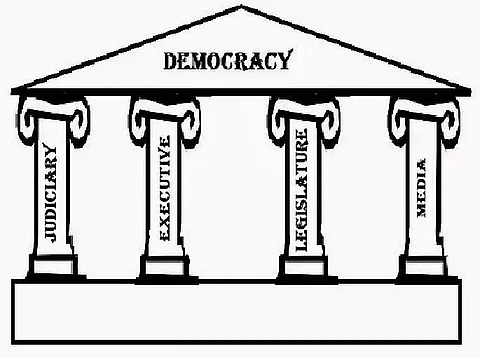
- Home
- Live Blog
- Breaking News
- Top Headlines
- Cities
- NE News
- Sentinel Media
- Sports
- Education
- Jobs

Sanasam Darius
(Gauhati University. Can be reached at sanasamdarius@gmail.com)
In Indian Constitution, the right to Press was interested in Freedom of Speech and Expression. A Free Press is the need for any Democratic Setup and becomes much more significant for a Large Nation like India with its diversity. In the case of Constitutional Provision regarding Freedom of Press is not directly given and hence Press Freedom is in some way endorsed and protected by the Judiciary. Indian media consists of several types of apparatus: Television, radio, cinema, newspapers, magazines, and online bases website/ portal. Modern Indian Media came to its existence during the 18th Century, Print Media was made a landmark in 1780, radio in 1927. And, in 2009, India ranked among the top 4th largest in Television broadcast (stations) in the world with nearly 1,400 stations.
The Ministry of Information & Broadcasting is the formal branch of the government which functions as the apex body to formulate rules, regulations and laws relating to broadcast, Press, films. Currently, Anurag Singh Thakur is in charge as the minister along with L. Murugan (MOs) and Apoorva Chandra (Civil) of the Ministry of Information and Broadcasting.
For broadcast, the Indian Government introduced Prasar Bharati through the Prasar Bharati Act of 1990 and came into effect in 1997. This organisation takes the central role to disseminate information through Radio and Television broadcast and hence India has Aakashvani for radio broadcast and Doordarshan for Television broadcast.
Prasar Bharati is headed by Chairman: (currently vacant) along with one CEO, one finance in-charge and six part-time appointees. Both Akashvani and Doordarshan are headed by Director in-charge General: N Venudhar Reddy & Mayank K. Agarwal respectively.
For Advertising and Publicity, the Directorate of Advertising and Visual Publicity (1955) which later on merged with the Directorate of Field Publicity, Songs & Drama division to be renamed as Bureau of Outreach and Communication in 2017 is the Government's Nodal Agency. Currently, Satyendra Prakash is the Principal Director General and 3 Additional Director General lead the organisation.
The Office of the Registrar Newspapers (RNI) was formed on 1st July 1956. The First Press Commission of 1953 amended the Press & Registration of Books Act of 1867 to establish RNI which is the Government's Statutory body responsible for the registration of various publications: newspapers, magazines, etc. Dhirendra Ojha is the current Press Registrar and Rina Sonowal is the Additional Press Registrar.
For Public and Media relations, the Government's Nodal Agency is the Press Information Bureau established in 1919 and its Principal Director-General is Jaideep Bhatnagar.
The Press Council of India, established in 1966 operates under the PCI Act of 1978 is the statutory, adjudicating & self-regulatory body which is officially in existence to preserve freedom of the Press and for maintaining, improving the standards of newspapers and news agencies in India. For a 3-year term, it is headed by a judiciary representative who takes office as the Chairperson, followed by one secretary and 28 additional members (20 from Media Industry, 5 from either of the Parliament, 1 from Sahitya Akademi, 1 from UGC & 1 from Bar Council). Currently, Justice Chandramauli Kumar Prasad is the Chairman who took office in 2021.
There is no surprise to state that no industry has grown, extended or succeeded as media in the present time. By exercising the freedom of speech and expression, media in developed countries play an important role in their society. In India, media has developed and emerged as a very powerful and influential tool in most matters. Media is the mirror of society, and how a democratic society can be represented by the status of its media. The media's role as a watchdog can promote: transparency, public scrutiny of those in power, uncover scandals in corporate & public sectors, and many more. In a democratic setup, the media functions as an agenda-setter, providing information about urgent social problems. The importance is even more critical during election times as fair access to the airwaves by opposition parties, candidates and groups are essential for a competitive, free-and-fair election.
India is the largest democracy in the world and it is widely accepted that media has a powerful presence in the country. Though media has played the role of watchdog of the government, a lot still needs to be done. India is ranked 142nd in the 2021 RSF WORLD PRESS FREEDOM INDEX. The media should take utmost care in aiding or publishing 'truth' in their news. It is a mirror of society and a powerful tool in implementing laws. When there is information, there is enlightenment.